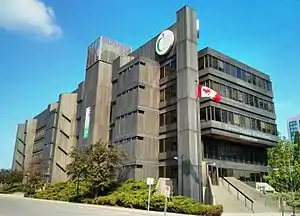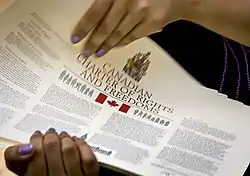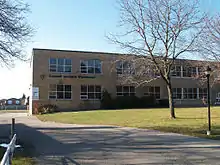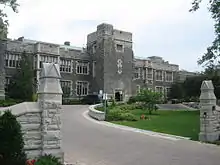Education in Toronto
Toronto is the most populous city in Canada and the provincial capital of Ontario. The city is home to a number of elementary, secondary, and post-secondary institutions. In addition to those institutions, the city is also home several specialty and supplementary schools, which provide schooling for specific crafts, or are intended to provide additional educational support.

Four publicly funded school boards provide elementary and secondary schooling to residents of the city, from Junior Kindergarten to Grade 12. The four school boards operate as either English or French first language school boards, and as either secular or separate school boards. In addition to publicly funded schools, elementary and secondary education is also provided by private religious school boards, independent religious schools, or independent secular institutions, such as college-preparatory schools.
Toronto is also home to a number of post-secondary institutions. There are six universities in Toronto with degree-granting authority, five of which are public university, while the other is a private seminary. In addition there are four degree- and diploma-granting colleges based in the city. Other post-secondary institutions based outside the city have also established satellite campuses, or share facilities with Toronto-based institution. Other forms of post-secondary institutions in Toronto include private vocational schools.
Elementary and secondary education
Public education

Four school boards in Toronto provide public elementary, secondary, and adult education. The four school boards operate as either English or French first language school boards, and as either secular or separate school boards.
The number of school boards based in Toronto, and the kinds of institutions that they operate are a result of constitutional arrangements found in the Constitution of Canada. Separate schools in Ontario are constitutionally protected under Section 93 of the Constitution Act, 1867, and is further reinforced by Section 29 of the Canadian Charter of Rights and Freedoms. French language schools in Toronto are constitutionally protected under Section 23 of the Canadian Charter of Rights and Freedoms.
In 1980 there were 7 French schools (secular and separate) in Metropolitan Toronto. Maurice Bergevin, the vice principal of the Etienne Brule School, stated that a study from Montreal in 1971 noted that if francophones in Toronto had the same proportion of schools that anglophones had in Montreal, there would be 31 francophone schools in Metropolitan Toronto. According to a 1971 Canadian federal census, Toronto had 160,000 francophones.[1] The number of French first language schools in Toronto has since grown to 26 (secular and separate). These do not include English school board's French immersion programs, which is intended for students whose first language was not French.[2]
Several alternative schools in Toronto are also operated by Toronto's public school boards.[3] The oldest is ALPHA Alternative School, which opened in 1972.[4] The first conference for publicly funded alternative schools in the Greater Toronto Area happened in Nov, 2012.[5] Ontario's Ministry of Education distance education program, the Independent Learning Centre, is also headquartered in Toronto.
Secular

Two public secular school boards operate in Toronto, the Conseil scolaire Viamonde (CSV), and the Toronto District School Board (TDSB). The former operates French first language schools in Toronto, whereas the latter operates English first language schools in the city. TDSB only operates schools in Toronto, whereas CSV operates as the school board for Toronto, and the larger Greater Golden Horseshoe region, and the Ontario Peninsula.
Both school boards were created in 1998, as a result of the Fewer School Boards Act, 1997. Prior to 1998, each municipality in Metropolitan Toronto had a public English language school boards. The six school boards, the Board of Education for the City of York, the East York Board of Education, the Etobicoke Board of Education, the North York Board of Education, the Scarborough Board of Education, and the Toronto Board of Education, all operated under the Metropolitan Toronto School Board umbrella. The Metropolitan Toronto School Board served as the umbrella organization for the municipally-based school boards of Metropolitan Toronto from 1953 to 1998. As a result of the Fewer School Boards Act, and the amalgamation of Metropolitan Toronto, the six municipally based school boards were amalgamated to form TDSB. The assets of the former Metropolitan Toronto School Board were also amalgamated into TDSB.
Prior to 1998, public French language schools were operated by the Conseil des écoles françaises de la communauté urbaine de Toronto (CÉFCUT). As a part of the Fewer School Boards Act, CÉFCUT was merged with other school boards from the Greater Golden Horseshoe and the Ontario Peninsula in 1998, forming CSV.
Separate

Two public separate school boards operate in Toronto, Conseil scolaire catholique MonAvenir, and the Toronto Catholic District School Board (TCDSB). The former operates French first language schools in Toronto, whereas the latter operates English first language schools in the city. TDSB only operates schools in Toronto, whereas MonAvenir operates as the school board for Toronto, and the larger Greater Golden Horseshoe region.
Prior to the amalgamation of Toronto in 1998, English and French separate schools in Metropolitan Toronto was managed by the Metropolitan Separate School Board (MSSB; Les Conseil des écoles catholiques du Grand Toronto in French). French separate schools in Metropolitan Toronto were operated by Section de langue française, a French language unit of MSSB. In 1998, MSSB was reorganized, with its English and French components split. MSSB's English component formed TCDSB, whereas its French component merged with several other French separate school boards in the Greater Golden Horseshoe to form Conseil scolaire catholique MonAvenir.
Independent
Toronto is also home to a number of private/independent elementary, secondary, and university-preparatory schools, including:

- A.R.S. Armenian School
- Abelard School
- Arrowsmith School
- Bayview Glen School
- Beach School
- Bishop Strachan School
- Blyth Academy
- Bond Academy
- Branksome Hall
- Brighton School
- Crescent School
- Crestwood Preparatory College
- Dragon Academy
- Giles School
- Greenwood College School
- Halton High School
- Hudson College
- Kingsway College School
- Linden School
- Lycée Français Toronto
- Metropolitan Preparatory Academy
- Montcrest School
- Nile Academy
- Toronto French School
- Toronto Prep School
- Toronto Waldorf School
- University of Toronto Schools
- Upper Canada College
- WillowWood School
- The York School
Religious schools
There are several private elementary and secondary religious institutions based in Toronto. In addition, there are two privately managed religious school boards that operate schools in Toronto. They include the Centre for Jewish Education, and the Toronto Adventist District School Board
Christian

Hindu
- Sathya Sai School of Canada[6]
Islam
- Abu-Huraira Islamic School
- Al Ashraf Islamic School
- Al Azhar Islamic School
- Al-Azhar Academy Of Canada
- As-Sadiq Islamic Schools
- Alashraf Islamic School
- Amanah Islamic Academy
- Baitul Mukarram Academy[7]
- Islamic Community School
- Islamic Foundation Islamic School
- ISNA Islamic School
- Iqra Islamic School
- Madinatul-Uloom Academy Of Canada
- Madrasatul-Banaat Islamic School
- Mariyah Islamic School
- Salahedin Islamic School
- Tayyibah Islamic academy
- Um al-Qura Islamic School
Jewish
- Associated Hebrew Schools
- Bais Yaakov Elementary School
- Bialik Hebrew Day School
- Bnei Akiva Schools of Toronto
- Bnos Bais Yaakov High School
- Eitz Chaim Schools
- Leo Baeck Day School
- Netivot HaTorah Day School
- Robbins Hebrew Academy
- Tanenbaum Community Hebrew Academy of Toronto (CHAT)
- The Toronto Cheder
- Tiferes Bais Yaakov
- Yeshiva Darchei Torah
- Yeshiva Yesodei HaTorah
- Yeshivas Nachalas Tzvi (Kaplans)
- Yeshivas Ner Yisroel
- Yeshivas Zichron Shmaryahu (Mesivta)
Defunct institutions
Toronto Academy was a former secondary school located on Front Street between Bay and York Streets[8] and had ties to Knox College, Toronto. Established in 1846 as an alternative to provincial schools, it severed ties with Knox College in 1849, and was closed shortly afterwards in 1852.[9] William Lyon Mackenzie's son, future Chief Justice Thomas Moss as well as first African Canadian doctor Anderson Ruffin Abbott.
Before 1987, a number of private Roman Catholic high schools were operated by several religious orders across Toronto. In 1987, a number of these schools joined the public Metropolitan Separate School Board after the funding was announced beginning in 1985. They included:
- Brebeuf College School (North York, 1963 - Society of Jesus (1963-1984) and Presentation Brothers (1984-1987))
- Father Henry Carr Catholic Secondary School (Etobicoke, 1974 - Basilian Fathers)
- Francis Libermann Catholic High School (Scarborough, 1977 - Congregation of the Holy Spirit)
- John J. Lynch High School (North York, 1963 - Congregation of Christian Brothers and Daughters of Wisdom)
- Loretto Abbey Catholic Secondary School (North York, 1847 - Sisters of Loreto)
- Loretto College School (Toronto, 1915 - Sisters of Loreto)
- Michael Power High School (Etobicoke, 1957 - Basilian Fathers)
- Neil McNeil High School (Scarborough, 1958 - Congregation of the Holy Spirit)
- Notre Dame High School (Toronto, 1949 - Congregation of Notre Dame)
- St. Basil-the-Great College School (North York, 1962 - Basilian Fathers)
- St. Joseph's College School (Toronto, 1850 - Sisters of St. Joseph)
- St. Joseph's Commercial School (Toronto, 1880 - Sisters of St. Joseph)[10]
- St. Joseph High School (Etobicoke, 1949 - Sisters of St. Joseph)
- St. Joseph's Morrow Park Catholic Secondary School (Toronto, 1960 - Sisters of St. Joseph)
Post-secondary education
Toronto is home to a number of post-secondary institutions, including colleges, and universities.
Universities

There are six universities located in Toronto. Four universities are located downtown, OCAD University, Ryerson University, Université de l'Ontario français and the University of Toronto. The University of Toronto also operates two satellite campuses, the University of Toronto Scarborough, located in the eastern portion of the city, and the University of Toronto Mississauga, located in the neighbouring city of Mississauga. The other two universities, Tyndale University, and York University, are based in an area of the city known as North York. York University maintains two campuses in North York, with plans to build another in the neighbouring city of Markham. Four of the five aforementioned universities are public degree-granting institutions. Tyndale is a private university and a Protestant seminary, and is the only private institution in Toronto with degree-granting authority.
In addition to these six institutions, the city is also home to the University of Guelph-Humber, a collaborative institution between the University of Guelph (based in Guelph, Ontario), and Humber College (a college based in Toronto). Guelph-Humber is not an independent institution and does not have the ability to issue its own degrees. Guelph-Humber acts as a satellite campus for its parent institutions, and its graduates are awarded degrees/diplomas from either the University of Guelph or Humber College.
Colleges
In Canada, the term college typically refers to a technical, applied art, or applied science school. Four colleges have their principal campuses located in Toronto, Centennial College, George Brown College, Humber College, and Seneca College. In addition, the city is also home to the satellite campus for Collège Boréal, a college based in Sudbury, Ontario. From 1995 to 2001, the French first language college, Collège des Grands-Lacs, operated in downtown Toronto. Following its closure in 2001, Collège Boréal assumed control of Grands-Lacs facilities, maintaining it as a satellite campus for the institution. Overall, the five colleges operate 29 campuses spread throughout the city.
Specialty

Toronto is home to a number of supplementary schools, which provides additional educational support for students in mainstream public, and private schools. The city also hosts a growing number of publicly funded and private English as a Second Language (ESL) schools and is home to as many as 10,000 ESL students at a time. These are either visa students primarily from Latin America, Asia and Europe, or newly arrived landed immigrants and Canadian citizens. Schools located in Toronto include:
See also
Notes
References
- "Toronto has 7 public schools for French-speaking children." The Canadian Press (CP) at Montreal Gazette. Wednesday May 21, 1980. p. 66. Retrieved from Google News (66 of 141) on July 24, 2013.
- "Early French Immersion". Toronto District School Board. 2014. Retrieved 7 September 2019.
- "TDSB alternative schools". Archived from the original on 2013-03-27. Retrieved 2013-04-12.
- Toronto Star article: School marks 40 years
- The GTA Conference on Alternative Public Schooling
- http://www.sathyasaischool.ca/
- "Archived copy". Archived from the original on 2014-10-19. Retrieved 2014-10-18.CS1 maint: archived copy as title (link)
- http://www.torontopubliclibrary.ca/detail.jsp?Entt=RDMDC-PICTURES-R-4795&R=DC-PICTURES-R-4795
- Vaudry, Richard W. (1989-10-24). The Free Church in Victorian Canada, 1844-1861. Wilfrid Laurier Univ. Press. p. 81. ISBN 9780889209794.
toronto academy was founded in 1846.
- Renamed to Thomas Merton Academy in c. 1985 and is now part of Bishop Marrocco/Thomas Merton Catholic Secondary School.
External links
![]() Media related to Education in Toronto at Wikimedia Commons
Media related to Education in Toronto at Wikimedia Commons